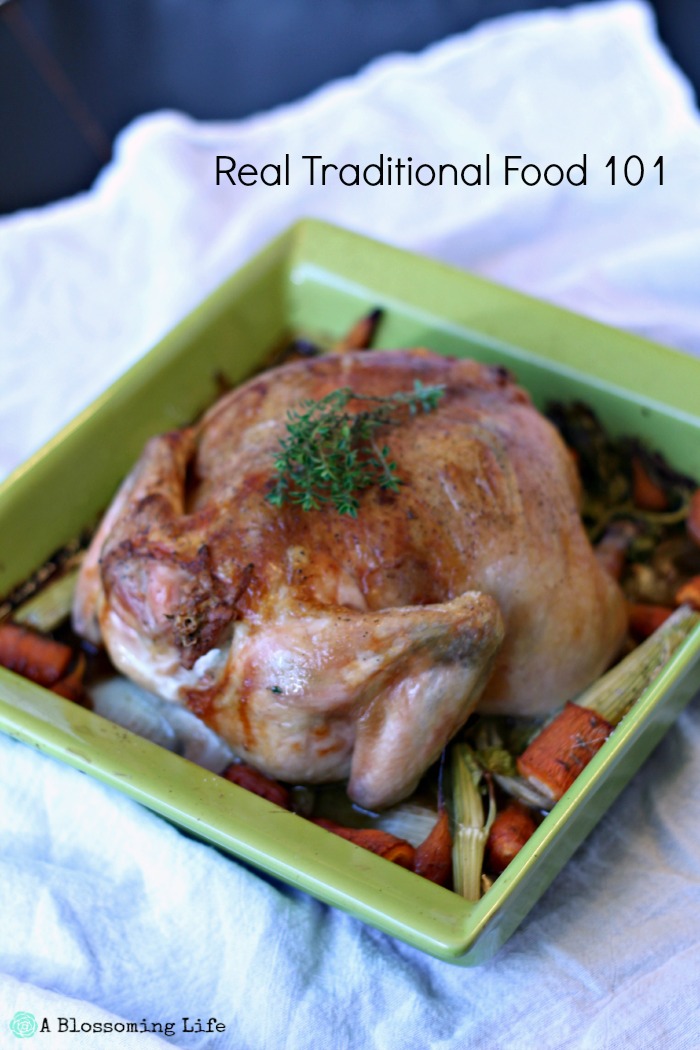Real Traditional Food 101
This post may contain affiliate links. Read disclosure policy.
I love that so many people today are interested in eating healthy, and more people are starting to take better care of their bodies. I have always been into nutrition. I even went on to get my Masters in Nutrition and became an RD (Registered Dietitian). But there are so many things I learned in school that, with lots of research, I came to find were not the complete truth. There are so many things I wish we would have covered. Like the effect a healthy diet can have on some autoimmune diseases, or the relationship between traditional diets, diseases, or lack of diseases.
What is Traditional Food?
Eating traditional food means eating as close to how nature created it as possible. I don’t know about you, but I trust God’s creation over scientists. Margarine is great example! After reading Real Food by Nina Planck and Nourishing Traditions by Sally Fallon, I became fascinated with Weston A. Price. A dentist who traveled around the world studying the teeth of native people. What he found was that native people eating traditional foods had little to no tooth decay and straight teeth. What do teeth have to do with nutrition? A lot, actually. Those same native people lacked western diseases that are far too common here.
Traditional foods are natural, unprocessed, nutrient dense whole foods including: grass-fed pastured meats, natural fats, raw dairy, and fruits and vegetables. Sugar, even natural (honey, molasses) was limited.
Meats:
Meats are preferably from grass-fed cows living on pasture without the use of pesticides. Fish should be wild caught, and chickens should be free ranged. We get meat through a meat run. Our friend goes twice a month to pick up grass-fed pastured meat directly from the farmer. We put in an order online and pick it up usually from church. This saves us a lot of money!
Dairy:
Dairy is best eaten raw, aka unpasteurized, full-fat milk from a local, trusted farmer. If you can’t get raw milk where you are, the next option would be full-fat pasteurized milk from grass-fed cows. There have been recent studies showing that people with high milk intake from pasteurized milk actually have a greater risk of fracture. But the opposite was true for fermented products. Unfortunately, raw milk wasn’t tested. (source)
Fats:
Fats should be minimally processed and include butter from grass-fed cows (preferably raw), coconut oil, lard, tallow, and cold-pressed olive oil. You should avoid all industrialized oils like vegetable, canola, soybean oil, etc. Fats may be consumed liberally. Natural fats don’t make you fat, and they don’t cause heart disease. That’s more related to our over processed SAD (standard American diets) diets.
Save This Recipe
Fruits and Vegetables:
All fruits and vegetables are welcomed. It’s best to buy organic. I know some people cannot afford organic (although, most of the time I buy organic the price is the same and sometimes better than conventional), and if that’s you, just try to buy local produce, focusing on buying the “dirty dozen” organic.
Grains/nuts/seeds/legumes:
In traditional diets, people would soak all their grains, nuts, and seeds in an acid solution (whey, lemon juice, vinegar, yogurt, etc) to break down the anti-nutrients phytic acid. Phytic acid binds to vitamins and minerals and prevents us from absorbing them. Soaking grains also helps make them easier to digest.
Sweeteners:
Sweeteners should be limited, but if you’re going to have something sweet, you want to avoid processed sugar and aim for raw honey, dried fruit, maple syrup, rapadura, date sugar, and coconut sugar.
Fermented foods:
Fermented foods like yogurt, kombucha, kefir, and fermented fruits and vegetables are full of beneficial bacteria. These are great to build a healthy gut. Our gut health is linked to many, many health problems. So, eating fermented foods can boost your health and even help prevent or treat illnesses.
Folks, that is the basis for eating real, traditional foods. Start tossing the boxed foods in your pantry and start eating real. Eating more traditional foods doesn’t have to be super strenuous or difficult. Start by making small changes (i.e. swapping out conventional diary for raw milk, buying some organic fruits and vegetables, or finding local and grass-fed meats). You don’t need to do everything at once. I like to set weekly goals that are health related. One week, my goal will be to drink more water, the next is to walk everyday, and I embrace a new habit and stick with it.
What is the hardest thing for you to change in your diet?


